Recipes
Traditional Ratatouille Recipe 2022
About Ratatouille Nicoise:
Ratatouille (/ˌrætəˈtuːi/RAT-ə-TOO-ee, French: [ʁatatuj] (listen); Occitan: ratatolha[ʀataˈtuʎɔ] (listen)) is a FrenchProvençal dish of stewedvegetables, originating in Nice, and sometimes referred to as ratatouille niçoise (French: [niswaz]). Recipes and cooking times differ widely, but common ingredients include tomato, garlic, onion, courgette (zucchini), aubergine (eggplant), capsicum (bell pepper), and some combination of leafy green herbs common to the region.
Origins
The word ratatouille derives from the Occitan ratatolha and is related to the French ratouiller and tatouiller, expressive forms of the verb touiller, meaning “to stir up”. From the late 18th century, in French, it merely indicated a coarse stew. The modern ratatouille – tomatoes as a foundation for sautéed garlic, onion, zucchini, aubergine (eggplant), bell pepper, marjoram, fennel and basil, or bay leaf and thyme, or a mix of green herbs like herbes de Provence – does not appear in print until c. 1930.
Preparation
The Guardian‘s food and drink writer, Felicity Cloake, wrote in 2016 that, considering ratatouille’s relatively recent origins (it first appeared in 1877), there exists a great variety of methods of preparation for it. The Larousse Gastronomique claims “according to the purists, the different vegetables should be cooked separately, then combined and cooked slowly together until they attain a smooth, creamy consistency”, so that (according to the chair of the Larousse’s committee Joël Robuchon) “each [vegetable] will taste truly of itself.” (Ratatouille nicoise)
Related dishes
Similar dishes exist in many cuisines. These include: pisto (Castilian-Manchego, Spain), samfaina (Catalan, Spain), tombet (Majorcan), ciambotta, caponata and peperonata (Italy and Tunisia), briám and tourloú (Greek), şakşuka and türlü (Turkish), ajapsandali (Georgian), lecsó (Hungarian), ghiveci (Romanian) and zaalouk (Moroccan). Different parts of the Indian subcontinent have their own versions of winter vegetable stew. Gujarat makes undhiyu, Kerala avial, and Bengal shukto. Confit byaldi can be considered as variation of the dish.
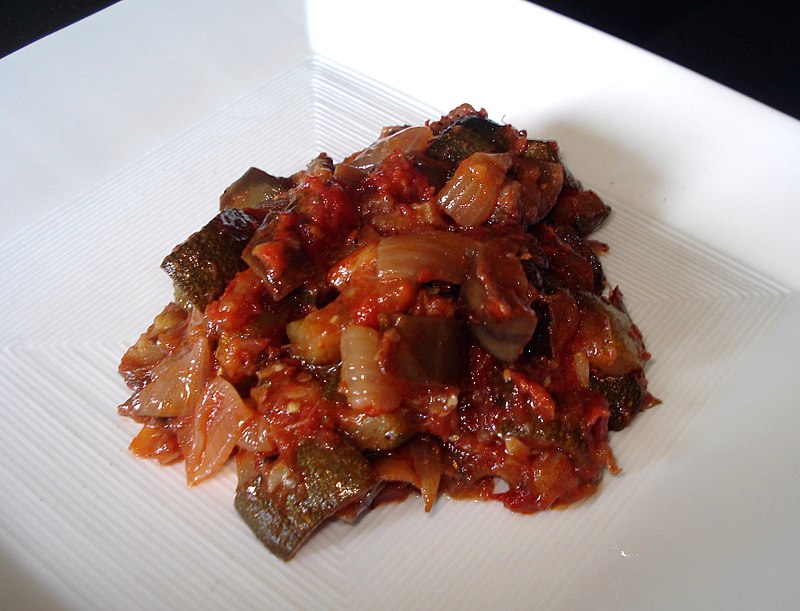
If you’re looking for a traditional ratatouille recipe to bring French Provençal cuisine to your dinner table, you’ve found it. Ratatouille is not only a healthy and hearty dish, it is also very easy to make, even for a beginner in the kitchen.
The original recipe contains no meat or fish, making ratatouille suitable for vegans as well.
In this article, you will learn about the origin of the dish, complete the ingredient list and learn about the preparation process. Also, I will share some preparation and serving tips. (Ratatouille Nicoise)
What Is Ratatouille?
Ratatouille is a famous dish from the Provence region of France. The region is known for its beautiful scenery and delicious food and wine, especially rose wines. Provençal cuisine is simple and makes use of fresh, seasonal ingredients. This is what gives it a Mediterranean flavor. Wild herbs complement seasonal vegetables and create a dizzying harmony of flavor. (Ratatouille Nicoise)
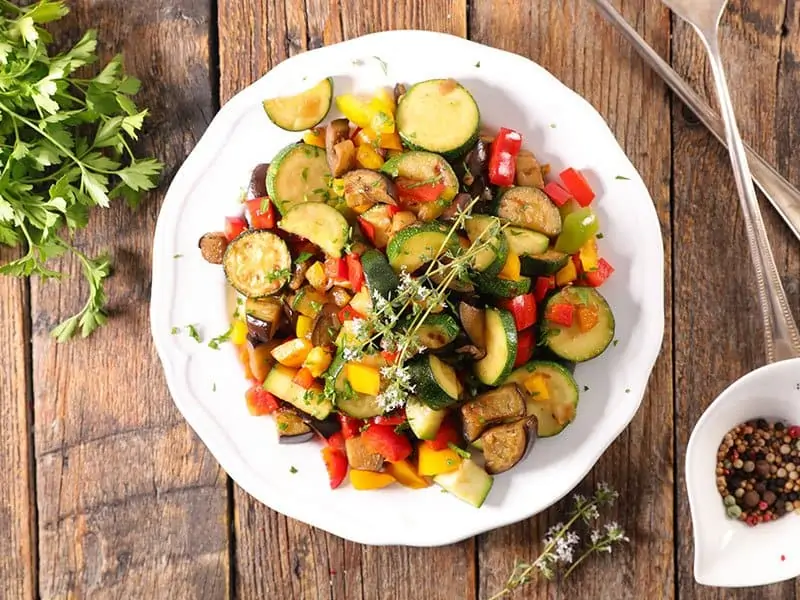
Ratatouille is actually a vegetable stew and was created to celebrate and thank the farmers. The fruits of their labor are included in the dish, and the recipe has many variations. Often you will come across eggplant, onions, zucchini and other vegetables and herbs.
The dish is sometimes called Ratatouille Nicoise when it contains capers, Nicoise or Kalamata olives.
However, a must for the recipe is the slow cooking process. It allows the ingredients to mix well and create a striking harmony of comforting flavors.
Due to its healthy and fresh ingredients, ratatouille is on the menu of those who want to lose weight in a healthy way. Also, the meal is well-balanced and a great choice for vegans and vegetarians because it contains all the beneficial nutrients.
The root of the name of the dish is the French verb touiller. The verb means to mix. While some may argue that the name represents the correct method of cooking, we will stick to the traditional recipe and cooking method. (Ratatouille Nicoise)
Is Ratatouille a Main Dish?
You can eat ratatouille as a main course, as farmers did in the past. However, nowadays ratatouille is more of a side dish and is only combined with pasta, rice, fish or chicken products as a main course.
Watch this video for more information:
Traditional Ratatouille Recipe
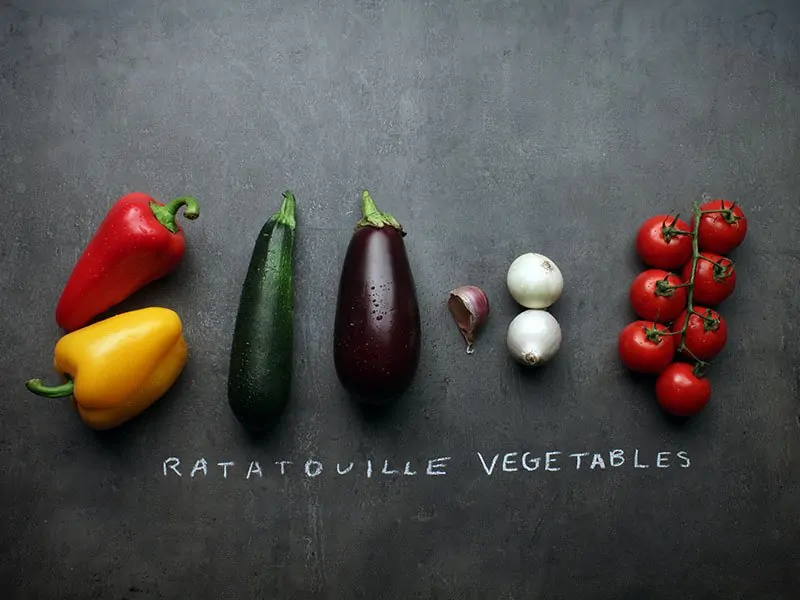
What do you need:
Chopping board
Sharp knife or vegetable chopper
garlic masher
deep casserole
bowl for mixing ingredients
Tray
Contents:
Onions
Garlic
fresh tomatoes
Courgette
Red and green bell pepper
yellow squash
Aubergine
olive oil
Vinegar
Salt
Pepper
Fresh or dried herbs in Provence
Basil
Average cooking time: One and a half to two hours (Ratatouille Nicoise)
Watch this video for more information:
How to Make Your Herbs de Provence for Ratatouille?
If you don’t have store-bought seasoning herbs in Provence, you can make them at home with the appropriate ingredients. Spices are essential for your ratatouille to taste authentically French. (Ratatouille Nicoise)
Here is what you will need:
- Spice grinder
- Bowl for mixing the ingredients
- Container with a lid
Ingredients:
- Fennel seeds – 1 tablespoon
- Dried tarragon – 1 tablespoon
- Dried chervil – 1 teaspoon
- Dried marjoram – 3 tablespoons
- Dried rosemary – 2 tablespoons
- Dried summer savory – 3 tablespoons
- Dried mint – 1 teaspoon
- Dried lavender – 1 teaspoon
- Dried basil – 1 tablespoon
- Dried thyme – 1/4 cup
Start by grinding the fennel seeds and rosemary in the grinder. Add the ground ingredients to a bowl and add the remaining herbs and spices to the bowl. Mix until everything is well mixed and store in a container with a lid. You will get enough seasoning for several ratatouille dishes. (Ratatouille Nicoise)
How to Pick the Ingredients?
Ratatouille is best when prepared from fresh seasonal vegetables. For example, summer tomatoes ripened in the sun will add a special fresh taste to the dish, but if you are out of season, you can choose high-quality canned tomatoes.
When choosing eggplant, try to find young and firm vegetables. The skin should also be sensitive. Do not use old and spongy eggplants, they are often greasy and may taste bitter.
Also look for young squash and yellow squash. Old vegetables will be hard on the outside and spongy on the inside.
Eggplant should also be young, thin and firm, with the skin sensitive enough to want to eat it. Avoid fat, old and spongy eggplants, they will ruin all your efforts. (Ratatouille Nicoise)
How to Cut Ingredients?
The traditional ratatouille has medium-sized pieces of vegetables instead of small ones. This will ensure that each ingredient retains its shape and distinctive taste. If you cut vegetables into small cubes, some may overcook and lose their shape during processing.
Try to cut vegetables evenly and approximately the same size; this allows you to get more vegetables on a fork but still get to know the ingredients. The size of a champagne flute may be optimal. (Ratatouille Nicoise)
Preparing Traditional Ratatouille – Step-by-Step Guide
Now that you have everything ready, it’s time to cook. I recommend preparing everything before you start cooking because the recipe will be easier to follow. And even experienced chefs don’t cut and cook at the same time!
Watch this video for more information:
Step 1
Ratatouille starts with onions. So you can cut them into pieces and set them aside while you prepare the other ingredients. For the traditional ratatouille, the bell pepper should be roasted. Wash and dry your peppers.
Preheat the oven to 400 degrees and place all the bell peppers on the baking tray in the tray and put them in the oven. Roasting whole bell peppers makes them sweaty, tender, and smoky.
After 20 minutes, turn the peppers over with the help of tongs and put them in the oven for another 20 minutes. You’ll know your peppers are done if the rind is soft and fluffy and the peppers have shrunk a little.
Take them out of the oven, let them cool a bit, peel them, remove the seeds, and cut the peppers into equal parts the size of onions and other vegetables.
Roasted peppers are delicious and one of the tricks of making traditional ratatouille. (Ratatouille Nicoise)
Step 2
Then chop the zucchini, yellow squash and eggplant and set aside.
If you have fresh tomatoes, use a strainer and a bowl to remove the seeds and dice the tomatoes. Collect the remaining water in a separate container. (Ratatouille Nicoise)
Step 3
The next thing is to prepare your garlic. Peel and chop the skins and put them in a separate bowl. Turn the oven to 375 degrees. (Ratatouille Nicoise)
Step 4
Add chopped yellow zucchini to a bowl and pour olive oil, salt and pepper on it. Use your hands to mix everything.
Repeat the process with the eggplant in a separate bowl.
For the traditional ratatouille, fry the zucchini and eggplant as you would with the bell pepper.
Place the vegetables on a baking sheet and put in the oven at 375 degrees for about half an hour. (Ratatouille Nicoise)
Step 5
While the eggplants and yellow zucchini are in the oven, you should put plenty of olive oil in the pan and start cooking your onions. Choose a large, deep pot in which you plan to cook the entire dish.
Add salt and stir the onions as it will help the onions release their juice. Do it on medium heat so the onions will slowly release their steam, which will add a nice flavor.
When you notice that the onions are releasing their juices, increase the heat a little and caramelize the onions until they are light brown. (Ratatouille Nicoise)
Step 6
After the onions are cooked, add the roasted zucchini, eggplant and peppers. Mix well and add the seedless tomato pieces next to the tomato juice. Stir again and cook for a few minutes over medium heat. Make sure you have enough tomato juice to cover all the ingredients and prevent it from burning later.
Then it’s time to add your garlic and seasonings. Start with the few herbs you prepared earlier, adding just salt and pepper first.
Bring the ingredients to a boil over medium heat to avoid burns. (Ratatouille Nicoise)
Step 7
Now is the time to get fancy. Practice Etuvee, a cooking technique that basically covers the pan with a lid, but not entirely. Make sure that the lid does not completely cover the pot so that the moisture can escape. (Ratatouille Nicoise)
Step 8
Let all the ingredients cook for about an hour on medium heat. The zucchini and eggplant pieces should be slightly soft, but cooked evenly and not tender. You should still be able to fork them. (Ratatouille Nicoise)
When your ratatouille is ready, let it cool overnight. Traditionally, ratatouille is prepared the day before, but letting it cool overnight enhances the flavors of the ingredients. Add some vinegar to boost the flavor of olive oil and tomato juice before you’re ready to eat. Add the herbs of the region, mix the ingredients and heat before serving.
You can also serve chilled ratatouille with bread. (Ratatouille Nicoise)
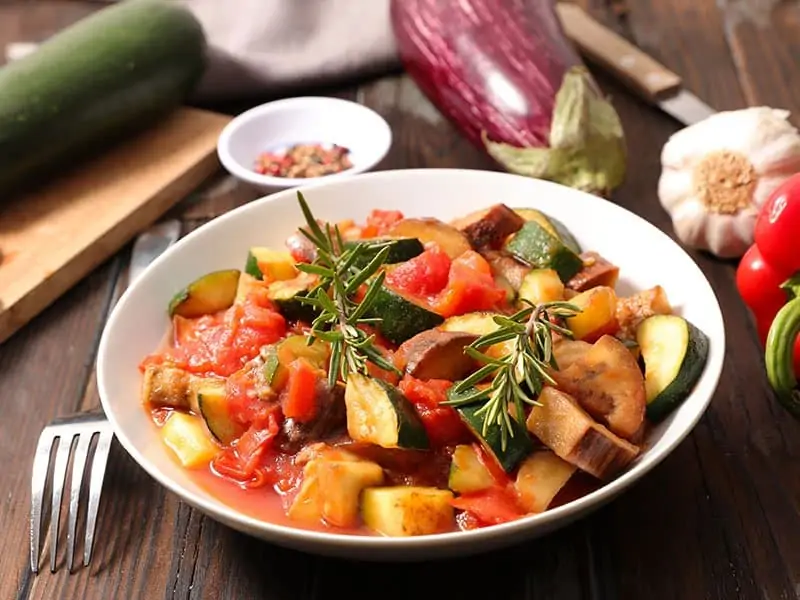
Ratatouille Recipes – Variations
Besides the different cutting techniques, some chefs also come up with their own versions of ratatouille. Some advocate cooking all the ingredients together, while others prefer to cook the vegetables separately and combine them at the end. (Ratatouille Nicoise)
The traditional ratatouille recipe calls for the bell pepper, zucchini and eggplant to be roasted separately and then slowly cooked together. In this way, the flavors will gradually merge, eventually achieving a unique taste. It is impractical to cook all the ingredients separately, but the fair argument is that each vegetable will retain its original taste.
But if you want a traditional Provencal meal, cook the ingredients in a large pot, starting with the onions and gradually adding the remaining ingredients. (Ratatouille Nicoise)
Some recipes suggest mixing the fresh ingredients in the pot, coating them with tomato juice, and placing them in the oven. While it may seem like a practical way to prepare the dish, the result is not a casserole like ratatouille is, but something different. You also risk getting sticky vegetables and spoiling the taste and presentation of your ratatouille.
Finally, you can find a beautiful presentation of ratatouille on social media, which suggests cutting the ingredients into small slices and aligning them in the pot to get a lively meal. While it looks nice, the thin slices are easy to overcook and you won’t get a ratatouille casserole. Instead, you’ll get squishy vegetables and a beautiful picture for your Instagram account. (Ratatouille Nicoise)
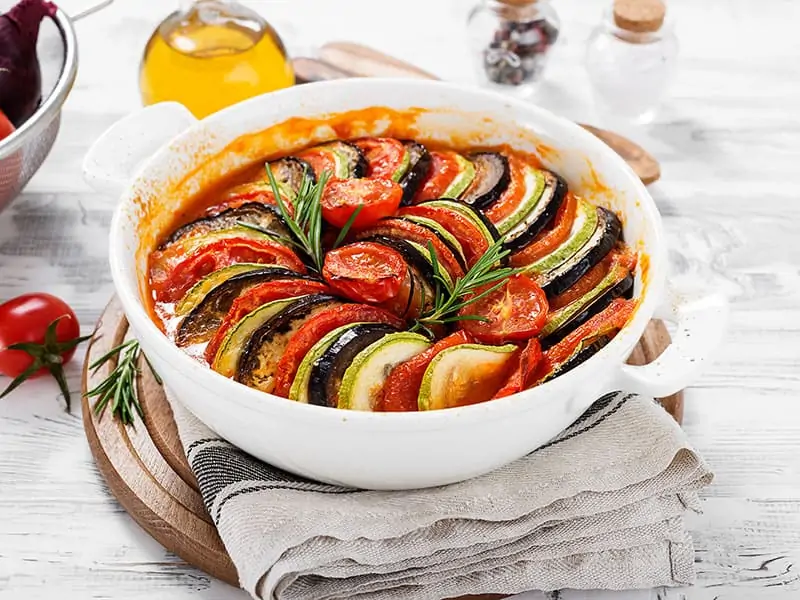
Watch this video to know more:
Top 3 Ways to Serve Ratatouille
Ratatouille is traditionally served with boiled rice or meat.
However, there are three creative ways to make a ratatouille the start of your meal – breakfast, lunch or dinner! (Ratatouille Nicoise)
Breakfast Idea
If you have some ratatouille leftovers, don’t throw them away. Instead, make an omelet as you usually do and pour the ratatouille remnants over it. The liquids will make the omelet juicy and the combination will be a hearty and healthy breakfast perfect to start an incredible day. (Ratatouille Nicoise)
Lunch Idea
Ratatouille pairs perfectly with grilled chicken and you don’t need much to garnish the dish. Grill the chicken and place a kitchen spoonful of ratatouille on the plate. Top it off with grilled chicken and voila – you just made a healthy meal that contains all the protein, vitamins and fiber you need to keep you energized for the rest of the day.
Ratatouille tastes better if you prepare it a day in advance and can stay fresh for several days in the refrigerator. The next day, you can use fish with boiled potatoes, rice or ratatouille. (Ratatouille Nicoise)
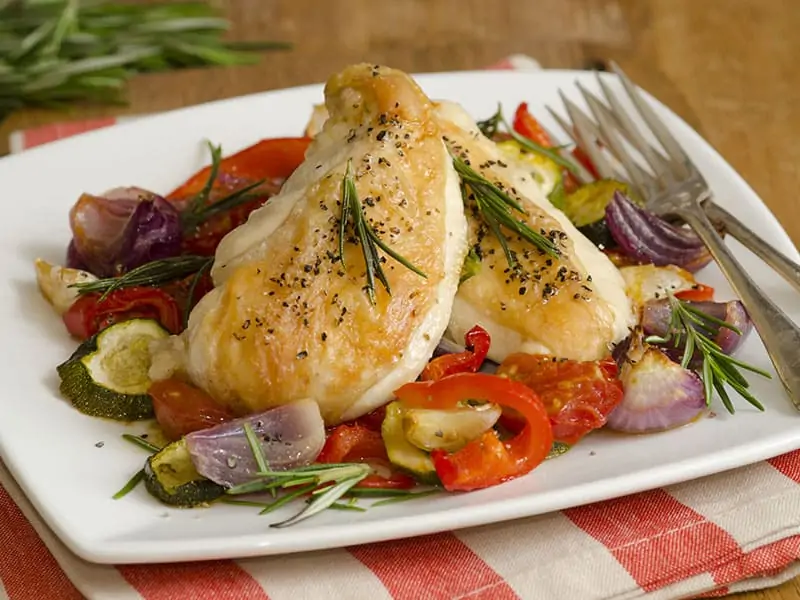
Dinner Idea
As a filling for pancakes, you can use ratatouille. Using a crepe maker, you can easily make pancakes from eggs, flour and milk or buy them at the store. Warm up your ratatouille and fill the pancakes with it.
Ratatouille pancakes are the perfect trick to feed kids healthy veggies. Garnish the pancakes with cherry tomatoes and fresh basil, your kids will love it. (Ratatouille Nicoise)
Heartwarming Ratatouille – Healthy and Easy to Make Family Dish
Ratatouille is easier to prepare than to pronounce and you will quickly learn how to make it. The flavors of this healthy dish depend on the freshness of the ingredients, and you’ll quickly become adept at choosing the best vegetable for your ratatouille.
It is a versatile dish that can be served with many other ingredients. Ratatouille stew is a great way for beginners to get to know French cuisine and bring a Mediterranean flavor to their plate!
If you liked my traditional recipe, please consider liking it and sharing it with your friends and family no matter their cooking skills! Ratatouille is easy to make and even beginners can succeed!
Have you ever made ratatouille at home? How was it?
Also, don’t forget to pin/bookmark and visit our blog for more interesting but original information. (Ratatouille Nicoise)
Related :
20 Weird Gifts to Your Weirdest Friend in 2021
Black German Shepherd Dog Apperance, Behavior, and Temprament Guide
22 Blue Flowers That You Will Hate For Not Knowing Before
10 Secrets About Cerasee Tea That Has Never Been Revealed for The Past 50 Years.
Can Cats Eat Lettuce – Is It Good Or Bad?
It’s so easy to prepare, I have to try it right away!
I did it by following you but I missed some salt but still nice!
Good, Thanks
Super